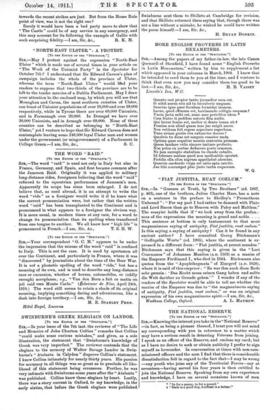"FIAT JUSTITIA, RUAT COELUM."
[TO THE EDITOR Of THE "SPECTATOR.") Sia,—In "Guesses at Truth, by Two Brothers" (ed. 1867, p. 463), one of the brothers, Julius Charles Hare, has a note on a sentence in the preface to Shelley's "Prometheus Unbound " : "For my part I had rather be damned with Plato and Lord Bacon than go to Heaven with Paley and Malthus." The essayist holds that if "we look away from the profan..- nese of the expressions the meaning is grand and noble. . . . This sentence at bottom is only tantamount to that most magnanimous saying of antiquity, Fiat justitia, mat coelum." Is this saying a saying of antiquity ? Can it be found in any ancient author? I have consulted Georg Biichmann's " Gefliigelte Worte" (ed. 1905), where the sentiment is ex- pressed in a different form : "Fiat justitia, et pereat mundus." Bachmann says that this saying is given in the "Loci Communes" of Johannes Manlius (A.D. 1563) as a. maxim of the Emperor Ferdinand I., who died in 1564. Bachmann also quotes from the " Apophthegmata " of Zincgref (A.D. 1626), where it is said of this emperor : "Es war ihm such diese Rede Behr gemein : 'Dan Recht muss semen Gang haben und sollte die Welt dariiber zu Grunde geben.' " I wonder if any of the readers of the Spectator would be able to tell me whether the maxim of the Emperor was due to "the magnanimous saying of antiquity, Fiat jwstitia, ruat coeltent," or was an original expression of his own magnanimous spirit.—I am, Sir, &c.,


















































 Previous page
Previous page